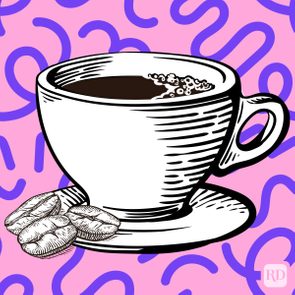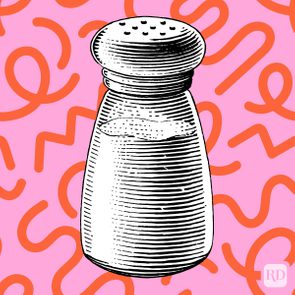You know it has nothing to do with poultry, but what's the real origin of the phrase cold turkey, and what does it have to do with quitting?

What’s the Origin of the Phrase “Quit Cold Turkey”?

From let the cat out of the bag to dog days of summer, there are all sorts of idiomatic expressions that don’t actually mean what they sound like they mean. Take quit cold turkey, for instance. Everyone knows you’re talking about quitting something—usually an addictive or unhealthy habit—not deciding to no longer eat lukewarm bird. But what do turkeys have to do with quitting? We’re taking a look at cold turkey’s origins to find out.
Read on to learn what the phrase cold turkey means, where it came from and how we use it today.
Get Reader’s Digest’s Read Up newsletter for more word histories, humor, travel, tech and fun facts all week long.
The meaning of cold turkey

Before we dive into cold turkey’s origins, let’s break down the meaning of the phrase quit cold turkey. You know what quit means, but cold turkey is a little less intuitive. Merriam-Webster defines the adverb as “all at once; abruptly.” When you quit cold turkey, then, you abruptly stop doing something (or try to, at least).
Often, the phrase is tied to bad habits. Even the noun version of cold turkey references this; its main definition is “abrupt complete cessation of the use of an addictive drug.”
Broadly speaking, quit cold turkey or go cold turkey means to stop doing something completely, usually an addictive habit.
Examples of cold turkey
The most common example you’ll likely hear is that someone is trying to quit smoking cold turkey. You may also hear it related to alcohol, drugs or unhealthy eating. The severity of quitting “cold turkey” specifically contrasts with a slower, more gradual quitting regimen. If you plan to quit something cold turkey, you plan to instantly go from doing it to not doing it.
Needless to say, quitting an addictive habit cold turkey may not always work, which is why it’s such a bold statement that you’re quitting something cold turkey. For instance, consider the medication Chantix’s ad campaign (complete with an animated turkey), which says that it can help smokers quit “slow turkey.” It works because there’s a general consensus that quitting cold turkey may not be realistic.
Of course, quitting cold turkey doesn’t have to refer to a substance-related habit. You can also say you’re quitting something like doomscrolling cold turkey, or really anything that you think you’re doing too much of and want to stop.
But none of that explains what it has to do with turkeys! For that, we’ll have to turn to the origin of the expression.
The origin of cold turkey
As far as language historians are aware, the phrase cold turkey first appeared in 1911, in Robert W. Service’s The Trail of ‘98: A Northland Romance. In it, Service writes:
“One morning I got up from the card-table after sitting there thirty-six hours. I’d lost five thousand dollars. I knew they’d handed me out ‘cold turkey,’ but I took my medicine.”
In context, it’s clear cold turkey refers to being conned in a card game. It would take another decade before the expression gained ties to quitting.
The origin of quit cold turkey
The first appearance of this expression in the “quitting” context comes from a 1921 edition of The Daily Colonist, a British Columbia newspaper. It describes patients of a certain doctor who are trying to kick an addictive habit:
“When they go before him, they are given what is called the ‘cold turkey’ treatment.”
Yet the most likely cold turkey origin is the expression talk turkey, first recorded in 1824. The phrases mean “tell someone something straight” or “be completely honest.” In a classic case of a figurative expression spawning another figurative expression, the phrase led to talk cold turkey.
While talk turkey originally referred to pleasant discourse, the variation talk cold turkey was used to mean engaging in straight-up, unfettered discourse. In fact, a 1920 newspaper cartoon used the expression cold turkey like this:
“Now tell me on the square—can I get by with this for the wedding—don’t string me—tell me cold turkey.”
Essentially, doing anything cold turkey meant doing it with no holds barred and no beating around the bush. (Hey, that’s another everyday idiom!)
There are a couple more literal explanations too, though they’re less likely. One suggests that the expression comes from the fact that actual cold turkey, as a dish, requires very little preparation time. The expression, then, was to compare someone’s instant quitting of a habit to the instant readiness of cold, leftover turkey.
Cold turkey’s link to addiction recovery
An oft-repeated cold turkey origin story suggests that the withdrawal symptoms experienced by addicts who stop using drugs—goosebumps, chills and pallid skin—called to mind a cold, uncooked bird and gave rise to the phrase. This explanation has been parroted in such publications as the San Francisco Chronicle and the book Cop Speak: The Lingo of Law Enforcement and Crime.
Recorded uses of the phrase, though, seem to suggest that talk turkey is the most likely origin of the quit cold turkey idiom we commonly use.
The use of cold turkey today
Pop culture has helped preserve and amplify the idiom, turning it into shorthand for (sometimes misguided, often gutsy) resolve. John Lennon’s 1969 song “Cold Turkey” is perhaps one of the most direct pop culture references, allegedly written about withdrawal symptoms he experienced during his struggles with addiction.
On the sitcom How I Met Your Mother, Marshall Eriksen vows to give up fast food cold turkey, and the result is a laugh-out-loud (and of course, fleeting) effort at clean eating. Sitcoms such as Friends, Modern Family and Brooklyn Nine-Nine similarly toss the phrase around—usually when characters decide to give up caffeine, dating apps or toxic exes.
Why trust us
At Reader’s Digest, we’re committed to producing high-quality content by writers with expertise and experience in their field in consultation with relevant, qualified experts. We rely on reputable primary sources, including government and professional organizations and academic institutions as well as our writers’ personal experiences where appropriate. We verify all facts and data, back them with credible sourcing and revisit them over time to ensure they remain accurate and up to date. Read more about our team, our contributors and our editorial policies.
Sources:
- Merriam-Webster: “Cold Turkey”
- Project Gutenberg: “The Trail of ’98: A Northland Romance by Robert W. Service”
- Merriam-Webster: “Why Do We Quit ‘Cold Turkey’?”
- Missouri State University: “Learn English Idioms: Cold Turkey.”























